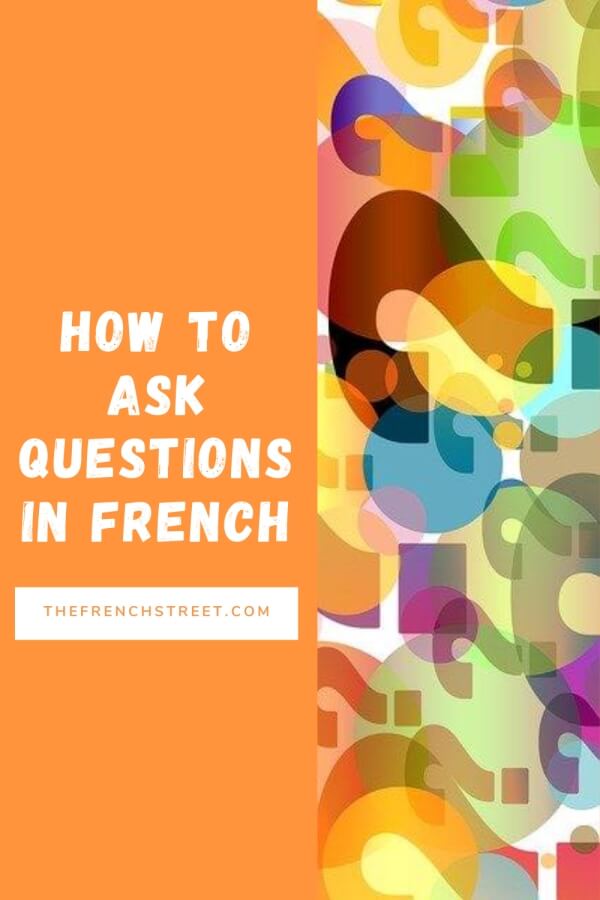Sooner or later, we need to ask questions. What time is it? How do I…? Where is the museum? How much does it cost? The list goes on and on. While asking questions in English or other languages is very straightforward, French is a little tricky in this respect. That’s why it’s essential to learn how to ask questions in French.
There are several ways to do it whether it is formally or informally. You may have heard some of these constructions in the past. It may be a little confusing for French students, but don’t worry. We’ll cover the most common ways to ask questions. Are you ready? Let’s jump right in!
Formally or Informally?

First off, you need to decide whether you want to be formal or informal. This will dictate how you will ask your questions. There are basically 4 ways to do this:
- By using est-ce que
- By inversion
- By intonation
- By using question words
Let’s take a look at each one of them and see the differences between them.
Est-ce que…?
This is probably one of the most used constructions when asking questions. We use this expression followed by the subject and the verb. Look at the following examples:
Est-ce que tu aimes la pizza? Do you like pizza?
Est-ce qu’il a une voiture? Does he have a car?
Est-ce qu’elles sont mariées? Are they married? (feminine)
Did you notice the pattern? The question is always Est-ce que + subject + verb. We can use this construction with all tenses, not only the simple present tense. The answer to questions with Est-ce que is always yes or no.
Inversion
This is the proper/formal way of asking questions. In this case, we have to invert the order of the subject and the verb, hence the name inversion. Let’s see how it works by changing the examples with Est-ce que.
Aimes-tu la pizza?
A-t-il une voiture?
Sont-elles mariées?
Did you notice we added a t in the second example? Why is that? Shouldn’t it be “A il une voiture?” For euphony purposes, the French add a t whenever the verb ends in a vowel and the subject pronoun starts with a vowel as well. Both the verb and the subject are always hyphenated.
If we use a proper name, we still have to use a subject pronoun. For example, Peter est-il canadien? (Is Peter Canadian?) You can also place it at the end, although this is a little less formal. Therefore, you could also ask “Est-il canadien, Peter?”
Just like est-ce que questions, the answer to inverted questions is yes/no.
Intonation
A more casual way of asking questions is by simply changing our intonation at the end of the question. Word order does not change. The only difference is you make your voice go up at the end. Look at the following examples:
Tu aimes la pizza?
Il a une voiture?
Elles sont mariées?
Notice this approach is extremely informal. You could use it with family or friends, but not in a formal setting. For formal questions, stick to inversion or est-ce que.
Question Words

Question words are also used to ask questions in French. The French question words are:
- que/quoi (what)*
- qui (who)
- où (where)
- quand (when)
- comment (how)
- pourquoi (why)
- quel/quelle (which)
Let’s look at some examples.
Que penses-tu? What do you think?
Tu fais quoi? What are you doing?
Qui est ton meilleur ami? Who’s your best friend?
Où est l’arrêt de bus? Where is the bus stop?
Quand est-ce que tu arrives? When do you arrive?
Comment allez-vous? How are you?
Pourquoi étudiez-vous le français? Why do you study French?
Quel groupe préfères-tu? Which band do you like best?**
*Quoi translates as what, but we don’t normally use it in questions unless it’s preceded by a preposition. We can also use it as a stand-alone question. Other than that, we use que.
**Quel/Quels/Quelle/Quelles can translate as who or what depending on the context.
You can watch the video below to better understand questions.
N’est-ce pas?
This is extremely formal, but it’s not incorrect. You can add the tag question n’est-ce pas at the end of a sentence. It’s equivalent to the right? in English, although in French it’s more formal. Look at the following examples:
Tu aimes ce livre, n’est-ce pas? You love this book, don’t you?
Ils habitent en Italie, n’est-ce pas? They live in Italy, don’t they?
Elle est chef, n’est-ce pas? She’s a chef, isn’t she?
Did you notice the pattern? We have to use a declarative sentence and then add the tag question at the end.
Summary
As we saw above, there are several ways to ask questions in French. You can ask questions by:
- Using est-ce que
- Inversion
- Intonation
- Question words
Remember you can also add n’est-ce pas at the end of a declarative sentence to seek confirmation.
You will have to determine if you want to be formal or not. The most formal way to ask questions is by using inversion. Questions with est-ce que are less formal but are not as informal as questions formed by just changing intonation.
So, now you know how to ask questions in French. I hope you liked it. Feel free to leave your comments below. Au revoir, les amis!



French is such a beautiful language. I hope with more of such tutorials I can be able to at least have a basic conversation like asking questions and telling a bit about myself. I always share how I did a 10 day course at a french academy but the tutoring was at a pace that I could’t keep up with. Your breakdown is easy to follow I must say. Is there any time or place when it comes to French where being formal is strictly not allowed or the opposite, being formal?
Hi, Nozipho,
Glad you found this useful. Feel free to check out my other articles.
To answer your question, not really. To be on the safe side, you can always use formal French. Of course, when you’re talking to friends, you can take an informal approach, but when talking to seniors, authorities, or strangers, stick to formalities.
Thanks for commenting.
I don’t speak French, but I understood the explanation and examples. The ways of asking Question in French is no different than in English. One must decide how they are going to ask the question or what suite them or is appropriate at the time.
As stated “You will have to determine if you want to be formal or not. The most formal way to ask questions is by using inversion” I believe this to be true in any language.
Hi, Billy,
There are many similarities between English and French, but I beg to differ regarding the rest of the languages. I know Spanish, for one, does not usually use inversion when asking questions. But you’re right, inversion is pretty common. The French peculiarity would be questions with est-ce que.
Thanks for commenting.
Well, this is really good and I am excited at what I have already learnt about this new language again because I feel like it just keeps getting better and better for me. I see that one should understand the importance of knowing when to use the formal and the informal languages when communicating in frech here. The video really helped me understand how toask questions in French even better. Thank you.
Hi, Jay,
Glad you liked it. Feel free to check out my other posts for more info and tips on the French language and culture. Thanks for commenting.